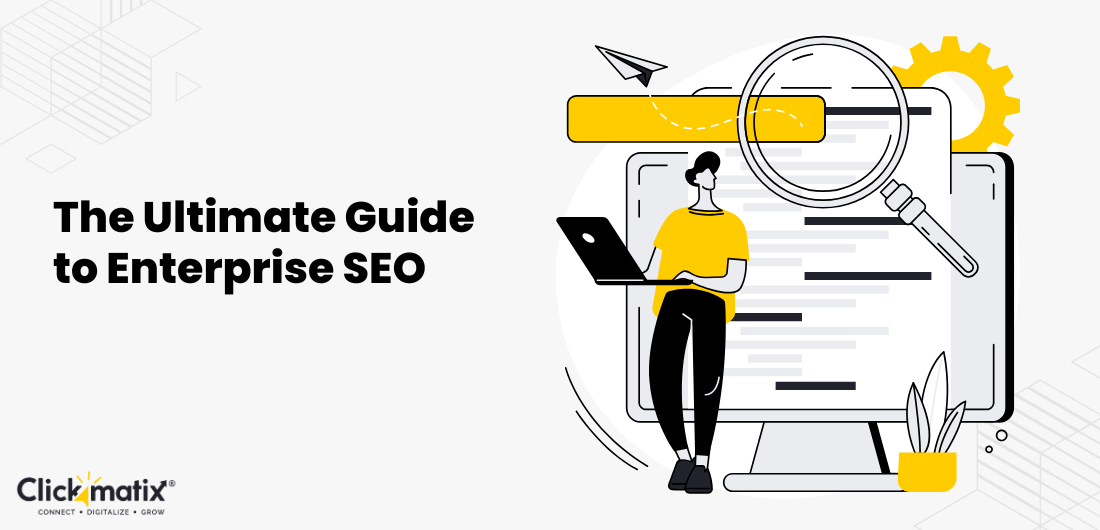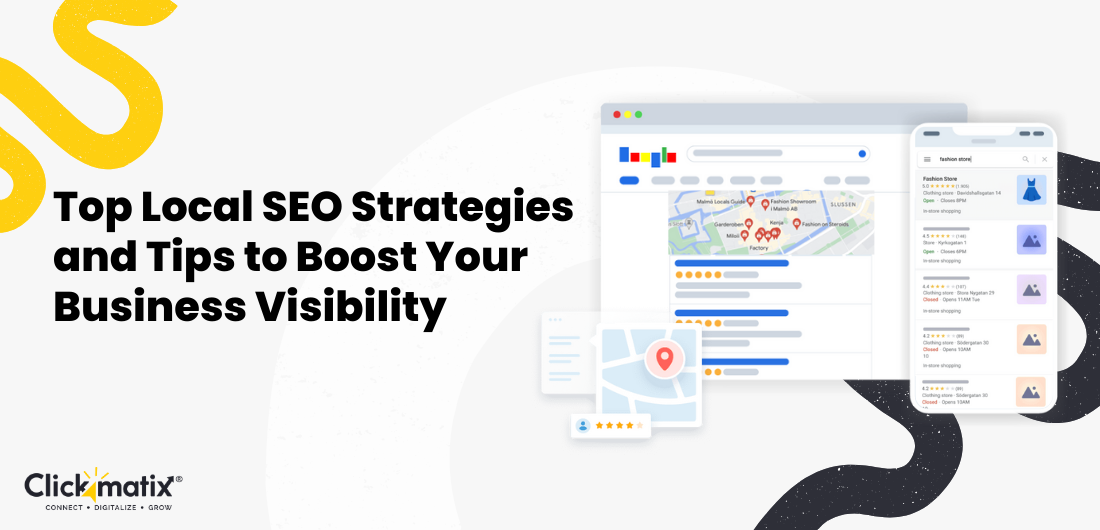The Ultimate Guide to Enterprise SEO
Large organisations face unique challenges when it comes to SEO. Managing thousands of pages, dealing with complex site structures, and maintaining consistent visibility is no small feat. Traditional SEO tactics, while effective for smaller sites, often fall short when applied to large enterprises. This is where Enterprise SEO steps in—a specialised approach that caters to […]

Large organisations face unique challenges when it comes to SEO. Managing thousands of pages, dealing with complex site structures, and maintaining consistent visibility is no small feat.
Traditional SEO tactics, while effective for smaller sites, often fall short when applied to large enterprises. This is where Enterprise SEO steps in—a specialised approach that caters to the complexities and scale of corporate websites.
But what exactly does Enterprise SEO entail, and why is it so critical for large-scale businesses?
Enterprise SEO is the backbone of a massive building. It ensures that each floor, hallway, and room (or, in this case, each page and section) functions smoothly and cohesively to keep the whole structure standing strong.
For companies like SaaS providers, E-commerce giants, and multinational corporations, partnering with the right SEO agency for Enterprise SEO solutions is key to thriving in a fiercely competitive landscape.
Let’s explore what sets Enterprise SEO apart from traditional SEO, why it’s so vital for large organizations, and how to craft an effective strategy.
What Is Enterprise SEO?
Enterprise SEO refers to specific SEO practices designed for large businesses with expansive websites, complex hierarchies, and multifaceted marketing strategies. Due to its sheer scale and complexity, it requires a different level of approach than small business SEO.
While traditional SEO may focus on optimising a handful of pages for a local bakery, Enterprise SEO solutions target massive websites with thousands or even millions of pages. It covers every aspect of optimisation, from managing crawl budgets to ensuring that all content is relevant, well-structured, and easily indexed by search engines.
The difference between traditional SEO and Enterprise SEO lies in the scope. Larger enterprises must juggle different subdomains, manage content across various regions, and maintain authority in fiercely competitive industries.
Why Enterprise SEO Is Crucial
The stakes are much higher for large companies with vast websites. Imagine a global SaaS company managing 50,000+ product pages or a large retailer dealing with daily content updates. The margin for error shrinks significantly at this scale, and a single oversight in technical SEO can result in massive drops in rankings and organic traffic.
Enterprise SEO ensures that brand visibility remains intact and even improves over time. As competition heats up, the pressure to maintain relevance on search engines is at an all-time high, making SEO an asset and a survival strategy.
For enterprises, investing in SEO means improving search rankings and driving more organic traffic, boosting conversions, and ensuring long-term brand equity. According to recent studies, organic search accounts for over 53% of all website traffic globally. Companies that ignore SEO are leaving money on the table.
Key Components of an Enterprise SEO Strategy
Enterprise SEO isn’t just about adding keywords to a few pages—it’s a multifaceted strategy involving technical finesse, content management, and collaboration across departments. Let’s dive into some of the core elements:
- Technical SEO: The Backbone of Enterprise SEO
Technical SEO is the foundation upon which a strong SEO strategy is built. Large enterprises need to ensure that their websites are both crawlable and indexable by search engines, all while offering a seamless user experience.
- Website Architecture: For enterprise-level sites, organising pages and ensuring proper internal linking is essential. A well-structured website helps both users and search engines navigate effectively.
- Crawl Budget Management: Search engines allocate a certain crawl budget to each site. When a site has thousands of pages, it’s crucial to ensure that the most important ones are being crawled frequently while irrelevant or low-quality pages are deprioritised.
- Structured Data and Schema Markup: Implementing structured data allows search engines to better understand your content, which can enhance search visibility through rich snippets.
- Page Speed Optimisation: Site speed is a major ranking factor, and improving load times across thousands of pages requires a granular approach involving image optimisation, script management, and content delivery networks (CDNs).
On-Page SEO: Optimising at Scale
When dealing with a site of hundreds of thousands of pages, on-page SEO becomes even more critical.
- Title Tags and Meta Descriptions: Every page should have a unique, optimised title tag and meta description. With enterprise websites, automation tools can help streamline this process, but manual oversight is still needed for priority pages.
- Duplicate Content Management: As enterprises scale, duplicate content becomes a significant issue. Implementing canonical tags and monitoring for duplicate content are key strategies for avoiding penalties.
- Internal Linking: Large websites need robust internal linking strategies to distribute authority evenly across all pages. This is where tools like Screaming Frog come in handy to audit and improve your link structure.
Content Strategy: Quality and Relevance at Scale
Content is the heart of SEO. For large companies, creating a scalable, cohesive content strategy is both an art and a science.
- Content Quality: Enterprises must prioritise high-quality, relevant content over sheer volume. Each page should provide real value to the user, focusing on long-tail keywords, customer pain points, and industry authority.
- Content Silos: Keeping content organised within appropriate silos ensures search engines understand the context of each page. For instance, separating blog content from product descriptions allows for a more coherent SEO strategy.
- Localised Content: Many large enterprises and E-commerce brands operate in multiple regions, making localisation critical. Global SEO strategies must account for language differences, cultural nuances, and region-specific search behaviours.
Off-Page SEO: Building Authority for Large Websites
For enterprise websites, off-page SEO strategies like backlink building and brand reputation management are pivotal. A strong backlink profile signals trust and authority to search engines.
- Enterprise-Level Link Building: Securing high-quality backlinks for enterprise websites often involves partnerships, collaborations, and public relations efforts rather than just guest blogging. Large enterprises should also monitor mentions and reviews to ensure positive brand associations.
- Brand Mentions and Citations: Even unlinked brand mentions can play a role in SEO. Monitoring and capitalising on these mentions can enhance brand visibility and authority.
Managing Large-Scale SEO Teams and Stakeholders
One of the biggest challenges for enterprise SEO firms is ensuring that SEO efforts align with company-wide goals. SEO professionals must collaborate across multiple departments, including marketing, IT, product development, and executive teams.
- Cross-Department Collaboration: Aligning SEO goals with the broader business strategy requires clear communication. Regular meetings between SEO specialists, content creators, and developers are key to fostering collaboration.
- Stakeholder Buy-In: Demonstrating the value of SEO to C-suite executives is a challenge in itself. Building a strong business case by showcasing traffic growth, ROI, and long-term benefits is essential for supporting SEO initiatives.
Technical Enterprise SEO Challenges
For enterprise companies, technical challenges abound, particularly when managing multiple subdomains or domains. These decisions can significantly impact your site’s domain authority and search rankings.
- Subdomains vs. Subfolders: The debate over whether to use subdomains or subfolders can dramatically affect SEO. Subfolders are generally preferred as they pass authority more efficiently, but subdomains might be necessary for brand differentiation or operational reasons.
- Website Migrations: Migrating a website is fraught with risks, particularly for enterprises. A well-planned 301 redirect strategy and vigilant monitoring of post-migration traffic can prevent a catastrophic loss of rankings.
Leveraging SEO Tools for Enterprise Websites
Enterprise companies need the right tools to manage SEO at scale. Automation plays a crucial role in ensuring efficiency without sacrificing quality.
- SEO Automation Tools: Tools like SEMrush, Ahrefs, and Botify allow large enterprises to automate technical SEO checks, monitor rankings, and track issues such as crawl errors and broken links.
- Analytics and Reporting: Corporate SEO requires robust reporting mechanisms. Tools like Google Analytics and Data Studio are indispensable for tracking KPIs, including organic traffic, keyword rankings, and search conversion rates.
Advanced Enterprise SEO Tactics
As technology evolves, so must SEO strategies. Enterprise companies need to stay ahead of emerging trends such as AI, voice search, and mobile-first indexing.
- Voice Search Optimisation: As more users rely on voice search, enterprises must optimise content for conversational queries, focusing on natural language and direct answers.
- Mobile-First Indexing: With Google’s shift to mobile-first indexing, enterprise sites must prioritise mobile performance, ensuring their websites are fully optimised for mobile devices.
- Future Trends in Enterprise SEO
The SEO landscape is constantly evolving, with AI and machine learning playing an increasing role. Enterprises must prepare for the impact of Google algorithm updates and the growing importance of SERP features such as featured snippets and knowledge panels.
Conclusion
Enterprise SEO is about crafting a comprehensive, scalable strategy that aligns with your company’s broader goals. Large enterprises can dominate the search landscape with the right technical foundation, content strategy, and collaboration. By embracing the future of SEO through AI, voice search, and mobile-first strategy, businesses will be well-positioned to maintain their competitive edge in the years to come.
In the end, SEO for enterprise companies isn’t a sprint—it’s a marathon that requires foresight, adaptability, and, above all, a commitment to excellence. When done right, the rewards are well worth the effort.
What's Your Reaction?









![Anatomy of a Facebook Ad: How to Create Scroll-Stopping Campaigns [+ Examples]](https://www.hubspot.com/hubfs/anatomy-of-a-fb-ad.png)






























.png)











































